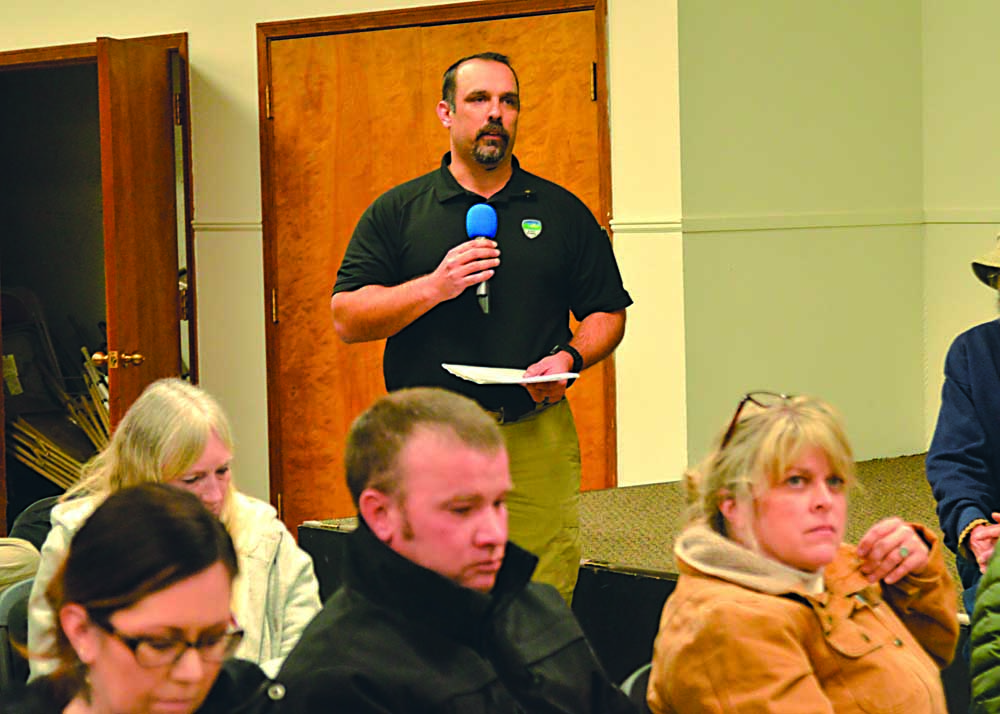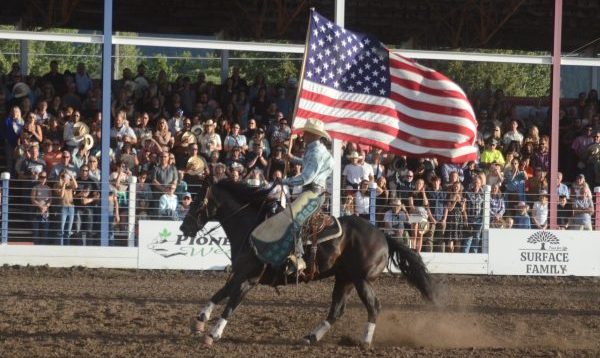No to development: Crowd opposes ‘hospitality project’
Published 5:00 pm Tuesday, March 8, 2022

- J.R. Collier, regional manager for the Oregon Parks and Recreation Department, speaks out against a proposed development on land next to Iwetemlaykin on the edge of Joseph during a public hearing Thursday, March 3, 2022, before the Joseph City Council. Greg Hennes and Ben Gates requested a zoning change to facilitate the development. They withdrew their request in the face of overwhelming public opposition.
JOSEPH — Overwhelming public opposition to a planned “hospitality project” on a parcel adjacent to the Iwetemlaykin State Heritage Site on the southern edge of Joseph led the property owners to withdraw a request for a zoning change for the project before the Joseph City Council on Thursday, March 3.
More than 70 people crowded into the Joseph Community Events Center for a public hearing on the zoning request. More than 60 signed up to give comment during the hearing, although only about 30 actually spoke. Many declined to speak, saying their points had already been made by others. Another half-dozen or so provided comment by letters.
Trending
Only two of the comments — both by letter — were in favor of the project.
The project
Local hotel owner Greg Hennes and his partner, architect Ben Gates, were requesting a zoning change from R-2 residential to commercial to allow for the project. It was to include a public bathhouse and sauna, an observatory, cabins, a guest lodge with kitchen facilities and workforce housing, according to the documents filed with the City Council prior to the meeting.
Hennes and Gates gave a presentation to the council and those in attendance on their plans for the project. They emphasized that the project would bring capital into the Joseph community, provide jobs at the facility and in construction, provide local financing, provide indirect spending by the construction team, attract visitor dollars, bring in lodging tax revenue and provide positive community health outcomes.
Hennes noted that the 3.23-acre parcel had previously been subdivided into three lots that could’ve allowed more homes than what he was planning.
“As many as 22 homes could be built on the site,” Hennes said. “Instead of building what’s allowed in the residential zone, we’re proposing a sensitively designed project made possible by the requested zone change and we’re looking to blend it into the land, add amenities for the community and help tackle the workforce housing (needs). So here you’ll see a commercial building on Main Street, second-story workforce housing and possible parking, a public bathhouse and sauna and cabins. Rather than building on top of the hill … we’re arranging to build along the east edge to preserve the natural landscape of the hilltop.”
Trending
He said he planned to hire locals and use local contractors on the project.
Gates emphasized how the project includes workforce housing, something Joseph — and Wallowa County — is in need of. He said since early in his career, he’s been involved in numerous projects to build affordable housing.
“I have a real passion for building affordable housing,” Gates said.
The pair cited Wallowa Lake Lodge as an example of such a project that blends in well with its background, saying their project would do likewise. They also said they were involved in restoring the Minam River Lodge and showed photographs of their work.
The opposition
But the owner of the Wallowa Lake Lodge was one who disagreed with Hennes’ and Gates’ plan, saying it would create a dangerous traffic situation at the north end of the lake similar to that which exists by the lodge at the opposite end of the lake.
A law enforcement officer, who declined to identify himself or the agency he works for, agreed.
“I don’t know how many times I’ve been on a crash on that corner. It’s one of the busiest highways in the summertime for law enforcement,” the lawman said. “It’s hard enough to get through Joseph on a regular day, but crashes happen. On a personal level, I moved to Joseph and Wallowa County in general because they have no stop (lights). Small-community living; that’s what I wanted. I came from Salem. I think that this type of commercial establishment will make us end up being like Bend. … As a law-enforcement officer, that’s a very dangerous corner there where they’re planning to enter and leave right next to the head of the lake where there’s already people backed up to the stop some days. So we’re just going to have more traffic? More crashes are going to happen.”
Robin Pace also had traffic concerns, saying it would be dangerous for the pedestrians and bicyclists that use the pave path along the highway at the site.
“Everyone knows it’s really busy in the summertime,” she said. “To see more traffic moving across that location that so much work was put into, I don’t think this is the place to put that.”
Location, location, location
Numerous opponents said it wasn’t so much the project itself, but the proposed location they objected to.
One couple, who lives just west of the proposed project and over the ridge, said they were concerned they’d lose a measure of privacy.
“It’s a sanctuary; it’s our backyard,” the husband said, receiving considerable applause. “I just think it’s not the right place for it. I think his plan’s cool, but to have it there is not what I would agree with.”
Michael Straw was another one who lives nearby, saying when he purchased his land he did so with the expectation it would retain the rural, secluded character it now has. He said for such a development to go forward, “would nullify that expectation.”
Leon Werdinger, who was the first to suggest to Hennes and Gates that they withdraw their zoning change request, said he appreciated that they had come to his home to explain the project. He took a fairly moderate view, despite his ultimate opposition position.
“The issue is the location, to me, not so much the guts of the project itself,” Werdinger said. “I don’t appreciate this being couched as a threat that if we go for this, there’s going to be this horrendous development. I don’t think that’s reality, either. I think that there’s momentum toward the purchase for the park and that’s a great outcome it seems for everybody, including the tribes. So I think the problem with this proposal is the location, first off, it leapfrogs development over a residential area. … This is a really bad place for a commercial zone and I’d just really appreciate it if you’d withdraw it.”
Other agencies
There was some dispute as to whether all appropriate agencies had been properly notified ahead of the hearing.
“I represent the Wallowa Lake Irrigation District, which owns the farmers’ ditch that runs alongside the property,” said Jay McFetridge, district vice president. “Given the fact that it’s part of our system of works and we weren’t notified about this going on tonight, our legal counsel hasn’t had time to look at it. Before you approve something, I’d like a continuance so we can consult with our legal team.”
J.R. Collier, regional manager for the Oregon Parks and Recreation Department, said his department and the state is also opposed to the zoning change — and the proposed project.
He emphasized that given that the land on which the project is planned is adjacent to the Iwetemlaykin State Heritage Site, that could be disruptive. He said the land was purchased in 2007 and it is managed cooperatively with the Nez Perce Tribe, the Confederated Tribes of the Colville Reservation, the Confederated Tribes of the Umatilla Indian Reservation and the National Park Service.
“Our collaborative partners oppose the zone change because of the visual impacts and the congestion on the highway and the damage to the resources on the state heritage site that it’s meant to protect,” Collier said. “For these reasons, we urge you to deny the zone change.”
Tribal opposition
Opposition by two of the three tribal groups involved with Iwetemlaykin drew some of the loudest applause by the audience. Although nothing was heard from the Colville Tribes, letters were read from Samuel Penney, chairman of the Nez Perce Tribal Executive Committee, and from a representative of the CTUIR.
“Iwetemlaykin State Heritage Site directly borders the proposed commercial zone,” Penney’s letter stated. He went on to mention the partnership between tribes and Oregon.
“The partner tribes were not notified of this application,” Penney said, adding that he urged the hearing be postponed for a month or to deny the motion since disturbance of the property from development could get in the way of future acquisition of the land.
“Iwetemlaykin lies within the Nez Perce homeland and its extraordinary location, the tribe maintains a deep connection to the biology, the culture and the historic resources of Northeast Oregon and the tribes have a unique interest in the protection of the aesthetics and natural beauty of the Wallowa Lake Basin and its environment because of the cultural and religious importance to the Nez Perce people,” Penney wrote. “It is no understatement to say that Wallowa Lake and its surrounding basin is an integral whole of the sacred place to the Nez Perce people.”
The future?
After Hennes and Gates withdrew their request for a zoning change, they declined to give their reaction to the hearing or to state any plans for the future.
But county Commissioner John Hillock had a challenge for the many who were present.
“I’ve spent the last two years helping to build a management plan for the East Moraine,” Hillock said, referring to the East Moraine Forest Management Plan intended to manage the roughly 1,800 acres in which the Wallowa Land Trust was instrumental in acquiring. “What I’m challenging you to do is get with the county government, get with the Land Trust, get with the city of Joseph, get with the State Parks and get with the tribes and buy the land. We need your support to do those things.”
Hillock said the public coming together like they did Thursday can bring results.
“All of you guys will have to help with this process to raise the money to do that, so I’m challenging you guys to help,” he said.









